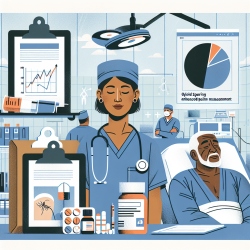Understanding Stigma: Improving Support for Marginalized Communities
In the world of speech-language pathology, data-driven decisions are essential for creating impactful outcomes, especially for children. However, the principles of understanding and addressing stigma are universally applicable, extending beyond traditional therapeutic settings. The recent research article titled COVID-19, Stigma, and the Ongoing Marginalization of Sex Workers and their Support Organizations offers valuable insights into the pervasive nature of stigma and its detrimental effects on marginalized communities. By examining these findings, practitioners can enhance their skills and better support those in need.
The Impact of Stigma
Stigma, as explored in the research, is a powerful force that exacerbates social inequities. Primary stigma, often associated with sex work, and courtesy stigma, which affects those associated with stigmatized groups, have both been highlighted as significant barriers. These stigmas limit access to essential services and funding, thereby marginalizing already vulnerable populations.
Key Findings and Strategic Actions
The study identifies three strategic actions taken by sex worker organizations to mitigate the impact of COVID-19:
- Challenging stigma to help sex workers access government emergency funding.
- Reorganizing and adapting services to provide outreach to sex workers in their communities.
- Advocating for continuous organizational funding.
These actions demonstrate resilience and adaptability, qualities that are crucial for any organization supporting marginalized groups.
Lessons for Practitioners
Practitioners in speech-language pathology and related fields can draw several lessons from this research:
- Understand the Role of Stigma: Recognize how stigma affects access to services and outcomes for clients. This awareness can guide more empathetic and effective support strategies.
- Advocate for Inclusive Policies: Support policies that promote equitable access to resources for all, regardless of background or occupation.
- Adapt Services to Meet Needs: Like the sex worker organizations, adapt services to meet the unique needs of clients, especially during challenging times like a pandemic.
Encouraging Further Research
The findings of this study emphasize the need for ongoing research into the effects of stigma and marginalization. Practitioners are encouraged to engage in further research to explore how these issues manifest in different contexts and to develop innovative solutions that promote inclusivity and equity.
To read the original research paper, please follow this link: COVID-19, Stigma, and the Ongoing Marginalization of Sex Workers and their Support Organizations.










